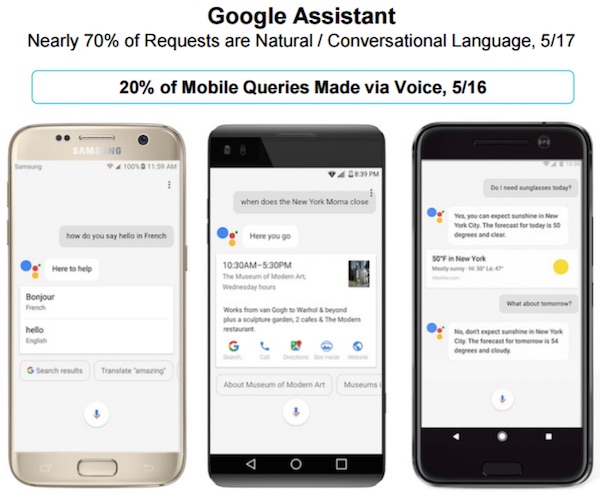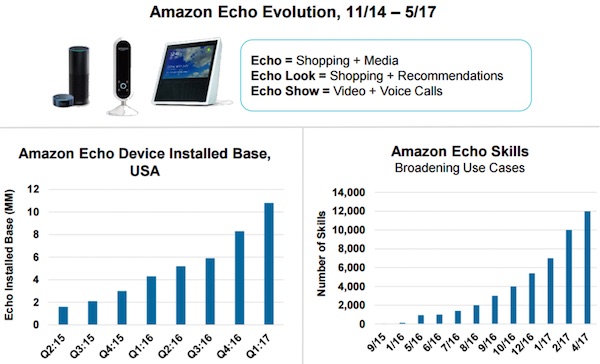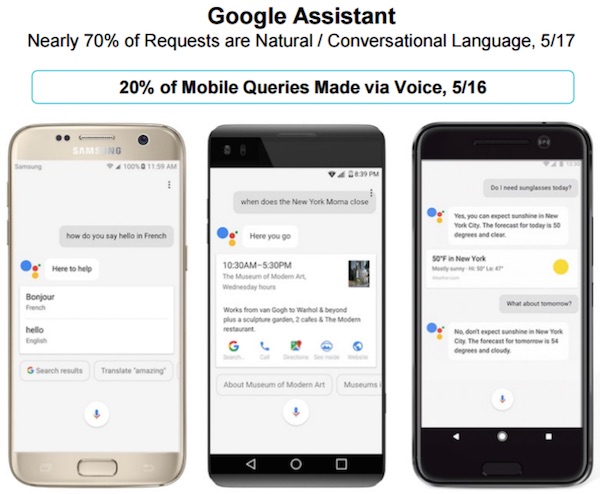In her 2017 Internet Trends report this week, Mary Meeker, partner at venture capital firm Kleiner Perkins Caufield & Byers, highlights the rise in voice search compared to manually typing queries into a search box on a smartphone. What Is Voice Search? Simply speaking commands into your device to receive a resulting answer constitutes a voice search. Part of the growing voice search use comes from the increase of in-home digital assistants like Amazon Echo’s Alexa and Google’s Home device, which have no manual interface and rely entirely on verbal requests and commands. The rise in conversational search is one of the most important trends for search engine optimization. That means that searchers are speaking to their digital search devices in the same way that they would ask a question of another person. How Do Google’s Search Results Reflect Voice Search? The top image is a purely factual request: “Where can I buy shoes?” The middle image shows an opinion-based query: “Where should I buy shoes?” In the last image, the search result is a blend of both because the verb that indicates intent is now neutral: “Where to buy shoes?” The differences here highlight the degree to which Google places meaning on slight variations of search phrases, the intent behind each variation, and the ability to serve search results specific to each intent. In other cases, the answer is more straightforward and Google can answer it directly on the page. Google Search is accomplishing the same goal as Google Assistant (for voice search): answer the question with one definitive answer.
For search engine optimization, the implications of voice search are subtle, but increasingly important. In her 2017 Internet Trends report this week, Mary Meeker, partner at venture capital firm Kleiner Perkins Caufield & Byers, highlights the rise in voice search compared to manually typing queries into a search box on a smartphone.

What Is Voice Search?
Simply speaking commands into your device to receive a resulting answer constitutes a voice search. Many top technology brands offer personified voice search, including Google’s “OK, Google” Assistant, Apple’s Siri, Microsoft’s Cortana, Amazon’s Alexa, and Samsung’s Bixby.
Over half of all Google searches now originate on a smartphone. Of those, 20 percent happen via voice commands — without the searchers touching their screen. Extrapolated out, that means that something like one in every 10 Google searches comes from voice search.
Voice recognition is also becoming more accurate, approaching 95 percent of the English language, which is equivalent to a human’s voice recognition accuracy, according to Google.
Part of the growing voice search use comes from the increase of in-home digital assistants like Amazon Echo’s Alexa and Google’s Home device, which have no manual interface and rely entirely on verbal requests and commands.
The Echo, in particular, has been very successful as a mainstream voice-interface device. Eleven million Amazon Echo devices have been sold in the U.S., enough for 3.5 percent of homes. Amazon’s devices are able to accomplish 12,000 different built-in capabilities such as turning on the living room lights or playing Jeopardy with you. The combination of voice interface and skills that make the Echo both fun and useful lends itself well to humans forming a sort of pet-like attachment to their devices, which only strengthens the tendency to speak to them naturally, as if they were alive.


COMMENTS